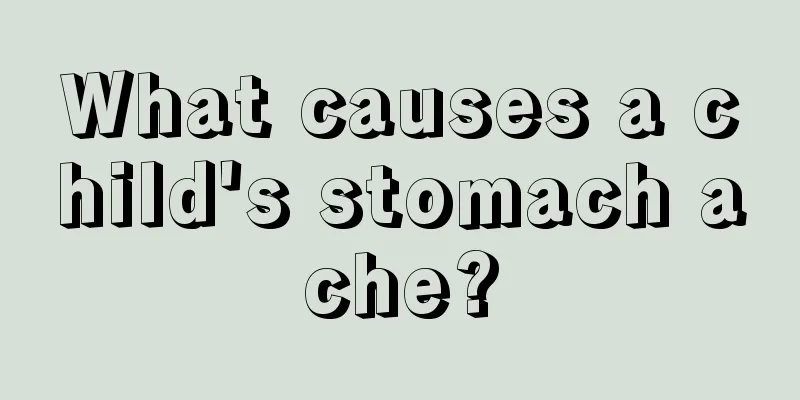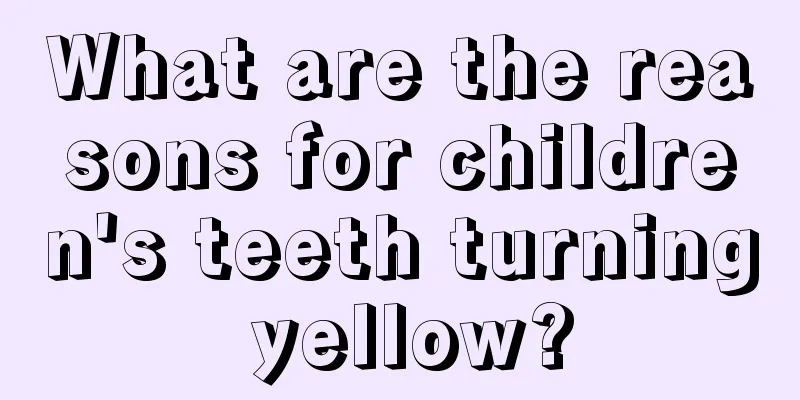What causes a child's stomach ache?

|
If a child has a stomachache, parents should pay attention to understand the cause and not change the child's medication at random. They should diagnose whether it is appendicitis, intussusception, biliary ascariasis, intestinal obstruction and other diseases, because these diseases can easily affect the child's health, and treatment should be given after diagnosis. 1. The child often has stomach pain, but no fever or diarrhea. The pain is usually in the belly button. The child may break out in a cold sweat, turn pale, or even roll around holding his stomach. But the pain will subside on its own after a while, and the child's eating and playing will return to normal. However, similar abdominal pain may still occur on the same day or the next day. This is the more common "intestinal spasm". Intestinal spasm is generally caused by an allergic reaction to food or even cold, which causes excitement of the nerves that control the intestinal wall. The intestinal wall muscles continue to spasm, causing severe abdominal pain, which disappears when the spasm is relieved. Each attack usually does not last long, and the stomach pain comes in waves, usually healing on its own after a few minutes to tens of minutes. When examining the abdomen, the entire abdomen is soft and not bloated. There is no fixed part that is afraid of pressure or pressing. Sometimes, massaging it can even provide comfort. This is completely different from abdominal pain that requires surgery. Abdominal pain may recur, but it will not affect the growth and development of children. 2. The incidence rate decreases with age. Common intestinal spasms can be treated without medication or injections. If you have persistent abdominal pain for several days in a row, or if you are afraid of pressure on your abdomen and vomit frequently, you should go to the hospital immediately to diagnose whether you have appendicitis, intussusception, biliary ascariasis, intestinal obstruction, or other diseases. 3. Comments and suggestions: Some children often have stomach pain when they are hungry or after meals. The pain is in the upper abdomen or around the navel. They often vomit acid, burp frequently, or suddenly have tarry stools. This may be a peptic ulcer. Some children have stomach pain accompanied by fever, cough, or diarrhea, which may be caused by respiratory or intestinal infections. Children who have poor hygiene habits and suffer from intermittent abdominal pain may have roundworms. Some children develop stomach pain a few days after a rash appears on their skin, especially on their legs. They should pay attention to allergic purpura. Some children experience abdominal pain, or even vomiting, sweating, and pale complexion after strenuous exercise. This is caused by lack of exercise and acute gastrointestinal ischemia, which can be relieved by resting for a while. If a child has abdominal pain that lasts for more than 2 hours, or the pain occurs frequently, the abdomen is afraid of pressing, the abdomen is obviously bloated, the child vomits frequently and has a fever, it may be a surgical disease and the child should go to the hospital immediately. |
<<: The best treatment for children's pharyngitis, medical experts will tell you
>>: How to quickly relieve the pain of tooth decay in children, these pain relief tips
Recommend
Commonly used medicines for children's cough
Cough is a common health problem among children. ...
How to treat aortic stenosis in babies
In the early stages of aortic valve stenosis, sym...
What causes children to have nightmares?
Both adults and children can have nightmares. In ...
When does a child's fontanelle close?
According to the editor's understanding, newb...
Effects and uses of Pediatric Jingfeng Powder
Families with children are very familiar with the...
Why does my child urinate less?
Urinating is a very important thing for the human...
Why do two-year-old babies love to bite?
A two-year-old baby always likes to bite people. ...
What can children with poor physical fitness eat to enhance their physical fitness?
It is not easy for every baby to grow up. Many pr...
What are the causes of low platelet count in newborns?
Low platelet count does not only affect young peo...
Can neonatal cerebral atrophy be cured?
Newborn babies have very weak body resistance and...
Why is there foam in the stool of newborns?
The stomach and intestines of newborns are relati...
What should I do if my child snores while sleeping?
Generally, parents will wait until their children...
What should I use on my baby's prickly heat?
In the hot summer, babies sweat a lot due to exer...
Reasons for a seven-month-old baby's cold and cough
With the birth of newborns, many friends who have...
Acupoint massage method for children with fever
The method of degree massage to relieve children&...









